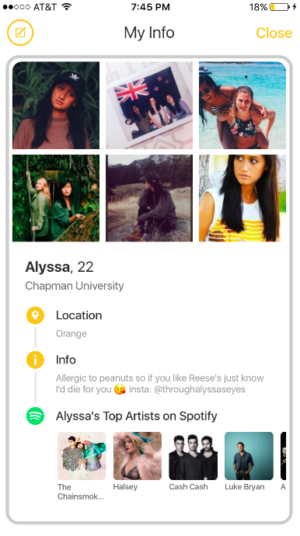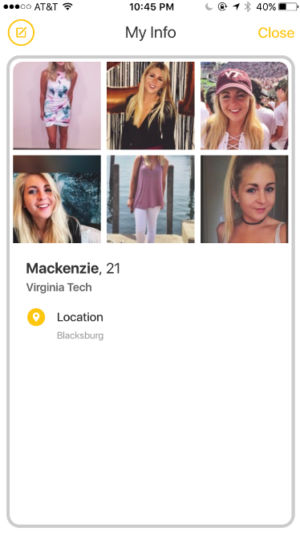Aside from her studies, for Chapman junior Alyssa Policarpio, a film production major, the day usually starts with a kale smoothie, she stalks herself on Instagram, listens to “Closer” 20 times, and ventures off to pick up her potential hook-up candidate from Tinder at 3:30 p.m.
The young woman she was about to meet described herself on Tinder as having long light-brown hair, from USC, and 19 years old. Once Policarpio arrives, she realizes the address the girl had given her was a high school. The Tinder candidate was not 19, she was 17, and in high school. And the party they went to was a shack.
So much for that dating app. But does she give up? Never. Dating apps are hot these days. You can go the general route, or specialize in potential dates based on your gender, your religion, or ethnic background.
When former Hillel chapter president Rachael Cohen was asked how many Jewish students used the Jewish dating app Jswipe, she answered: “Almost all of them.”
Policarpio is glad technology has provided her an innovated way to view the world through different paradigms.
“You talk to talk to someone on Bumble and you meet them at the bar. You talk to someone on Tinder and you meet them at a trap house,” she said.
Policarpio has her own procedure. She uses three dating apps, Tinder, Bumble, and Her.

“I go through 20 profiles on each application and repeat until I find a suitable candidate. I have discovered that this procedure is most efficient. It’s kind of like a workout routine for my thumbs,” she said.
Are dating applications a desperate measure or a convenience? As technology has made it easier for people to communicate across the globe, does this change the dating game? Some students think of dating apps as the last measure to take. Others just see the as an easy way to meet people.
Before dating apps there was online dating. This online dating was done through websites such as eHarmony and Match.com Online dating had a negative reputation and connotation established in the younger generation’s minds. The poor marketing made it seem dating online was a desperate measure that was meant for meatloaf loving dads. That connotation was passed on to dating apps at first. But students are finding themselves more and more comfortable with them.
Grindr was the first dating app to launch in 2009. The Tinder in 2012. It was not until 2014, however that Tinder began revolutionizing the dating world and started registering about one billion “swipes” per day. Dating apps are heavily marketed on the college community. It is now seen as the modern way to meet people from across the globe.
Besides Tinder and Bumble, highly popular with women, there are a variety of different dating apps, all specialized for everyone’s needs. The two most popular apps by far are Tinder and Bumble.
Alekha Kulkarni, Chapman senior business major, has a different opinion when it comes to Tinder and Bumble, and noted: “I like Tinder more than Bumble. People think Bumble is better than Tinder because Bumble does not necessarily indicate hooking up as much.. but IT IS a ‘hook up app.’ I think girls starting a convo is fun for a while, but it gets annoying. I want the men to take control,” said Kulkarni.
Is the only difference between Bumble and Tinder that the woman has more control on one and not the other? With Bumble, only women can initiate a call.

Sydney Acosta, Chapman senior art major, is a newbie to the dating application world. Many of her friends strongly support dating applications, she was intrigued to download one for this reason. Out of all the options, Sydney made Bumble the first application to download. “I just didn’t want to be annoyed by men messaging me. I wanted to pick and choose who and when we can talk,” said Acosta. No matter who has the ability to message first, two people must mutually swipe on each other to spark up a conversation on all dating apps. For this reason, it is interesting that ‘messaging dibs’ is such a large contributor to people’s decision-making when deciding on a dating application to use.
Do people ‘regret’ swiping on each other? Perhaps they were feeling generous with swipes, and when they get messaged because of the interest they demonstrated they then feel compelled to respond?
Aside from ‘first messaging dibs,’ another substantial element to the dating app arena is the profile. People decide if they like the other person enough to talk to them based on their profile. So how you set up a profile is important.
Some are approaching the number of dates they’ve gone on through apps for bragging rights. The general rule is, if one date doesn’t work out: Keep swipin’.
